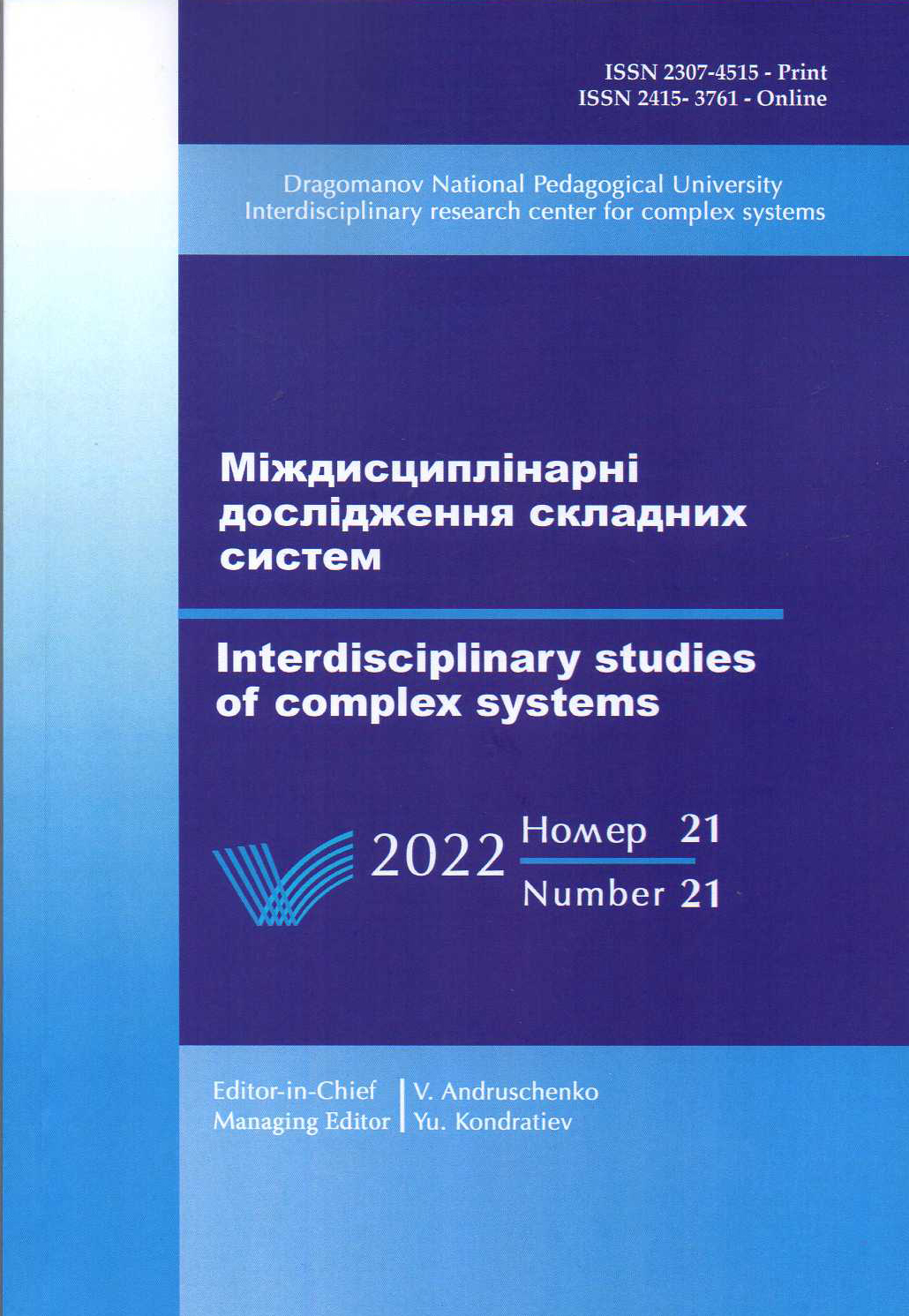Intercultural studies in the university community in the focus on social cohesion development
DOI:
https://doi.org/10.31392/iscs.2022.21.005Ключові слова:
cognitive focus, cultural diversity, intercultural studies, social cohesion, organized society, university communityАнотація
The present article continues the cycle of social cohesion re-
search in education and society. In order to research the main principles
of organized society, the main foundations of social cohesion and their ap-
plications in the educational sphere are very important. The main goal
of the article is to consider the intercultural aspect of social cohesion and
to provide intercultural study in the university community. This study
starts with the 눿rst diagnostics of the cognitive focuses of intercultural
communications in the university community of the National Pedagogical
Dragomanov University. Cultural diversity is considered the foundation
and the central part of intercultural studies. The purpose of the study is
to provide a conceptualization of cognitive focuses in intercultural commu-
nications, to determine the actual level of intercultural competence, to test
the author’s questionnaire, and to determine the further steps for enhanc-
ing intercultural communications in the educational community. Methods
that were used in the study are the author’s questionnaire, math analyt-
ics, etc. There were 272 persons interviewed at the National Pedagogical
Dragomanov University, namely 230 students and 42 teachers. According
to the research results, the level of intercultural competence of students
and teachers is relatively high, and all indicators are above average, which
positively characterizes the attitude of students and teachers of the uni-
versity to other cultures, their perception of other cultures, tolerance and
willingness to cooperate and combine cultural activities. This is impor-
tant at this time, because Ukraine is on the path to European integration,
bravely defending its own choice, where one of the main values is respect
and acceptance of cultural diversity.
Посилання
AlTaher, B.B. 2019. The necessity of teaching Intercultural Communication in higher education. Journal of Applied Research in Higher Education, 12(3), 506–516. https://doi.org/10.1108/JARHE-04-2019-008.
Andrushchenko V. 2021. Organized Society: Problems of social self-organization and institutionalization in the period of radical transformations in Ukraine at the turn of the century: Experience of socio-philosophical analysis in 2 books. Book Two. Modern State Formation Philosophy Third edition, amended and supplemented. — Frankfurt am Main: GFI GmbH, 704 p.
Bachtler, J. and Mendez, C. 2016. EU Cohesion Policy and European Integration: The Dynamics of EU Budget and Regional Policy Reform, London, Routledge, 336 p. https://doi.org/10.4324/9781315580630.
Blum, L. 2014. Three educational values for a multicultural society: Difference recognition, national cohesion and equality. Journal of Moral Education, 43:3, 332–344. https://doi.org./10.1080/03057240.2014.9227.
Dielini, M., Portera, A., Nesterova, M., & Milani, M. 2022. Social cohesion and intercultural studies in the educational community. Skhid, 3(2). https://doi.org/10.21847/1728-9343.2022.3(2).263601.
Grierson, E. M. 2016. Trust and duciary relationships in education: What happens when trust is breached? Educational Philosophy and Theory. http://dx.doi.org/10.1080/00131857.2016.1231052.
Guttormsen, D. S. A. 2018. Advancing Otherness and Othering of the Cultural Other during “Intercultural Encounters” in Cross-Cultural Management Research. International Studies of Management & Organization, 48(3), 314–332. https://doi.org/10.1080/00208825.2018.1480874.
Healy, M. 2018. Belonging, Social Cohesion and Fundamental British Values. British Journal of Educational Studies. https://doi.org/10.1080/00071005.2018.1506091.
Hutchinson, J. P. 2016. Moving convergence culture towards cultural intermediation: social media and cultural inclusion. Continuum, 30(2), 158–170. https://doi.org/10.1080/10304312.2016.1143161.
Kawashima, N. 2006. Audience development and social inclusion in Britain. International Journal of Cultural Policy, 12(2), 55–72. https://doi.org/10.1080/10286630600613309.
Lawrence, B. 2014. Three educational values for a multicultural society: Difference recognition, national cohesion and equality. Journal of Moral Education, 43:3, 332–344. https://doi.org./10.1080/03057240.2014.9227.
Le, H., et al. 2015. Social Inclusion Through Cultural Engagement Among Ethnic Communities. Journal of Hospitality Marketing & Management, 24(4), 375–400. https://doi.org/10.1080/19368623.2014.911714.
Mуnico, P., et al. 2018. Teacher knowledge and attitudes towards inclusion: a cross-cultural study in Ghana, Germany and Spain. International Journal of Inclusive Education, 24(5), 527–543. https://doi.org/10.1080/13603116.2018.1471526.
Nesterova, M., et al. 2020. Trust as a cognitive base of social cohesion in the university communitie. International Journal of Cognitive Research in Science, Engineering and Education (IJCRSEE), 8(1), 15–23. https://doi.org/doi:10.5937/IJCRSEE2001015N.
Nesterova, M., et al. 2019. Social Cohesion in Education: Cognitive Research in the university community. International Journal of Cognitive Research in Science, Engineering and Education (IJCRSEE), 7(2), 19–27. https://doi.org/10.5937/IJCRSEE1902019N.
Ramburuth, P. and Welch, C. 2005. Educating the Global Manager. Journal of Teaching in International Business, 16(3), 5–27, https://doi.org/10.1300/J066v16n03_02.
Romani, L., et al. 2018. Cross-Cultural Management Studies: State of the Field in the Four Research Paradigms. International Studies of Management & Organization, 48(3), 247–263. https://doi.org/10.1080/00208825.2018.1480918
Searle J.R. 1992. The Rediscovery of the Mind, Massachusetts Institute of Technology 1992, 270 p.
Strandbrink, P. 2017. Cultural Pluralism and Social Cohesion. In: Civic Education and Liberal Democracy. Palgrave Studies in Global Citizenship Education and Democracy. Palgrave Macmillan, Cham. https://doi.org/10.1007/978-3-319-55798-4_3.
Strogilos, V. 2012. The cultural understanding of inclusion and its development within a centralised system. International Journal of Inclusive Education, 16:(12), 1241–1258. http://dx.doi.org/10.1080/13603116.2011.557447.
UNESCO Universal Declaration on Cultural Diversity. http://portal.unesco.org/en/ev.php-URL_ID=13179&URL_DO=DO_TOPIC&URL_SECTION=201.html.
Value-based Education. https://www.ledbury.hereford.sch.uk/values-based-education/.
##submission.downloads##
Опубліковано
Номер
Розділ
Ліцензія
Автори, які публікуються у цьому журналі, погоджуються з наступними умовами:- Автори залишають за собою право на авторство своєї роботи та передають журналу право першої публікації цієї роботи на умовах ліцензії Creative Commons Attribution License, котра дозволяє іншим особам вільно розповсюджувати опубліковану роботу з обов'язковим посиланням на авторів оригінальної роботи та першу публікацію роботи у цьому журналі.
- Автори мають право укладати самостійні додаткові угоди щодо неексклюзивного розповсюдження роботи у тому вигляді, в якому вона була опублікована цим журналом (наприклад, розміщувати роботу в електронному сховищі установи або публікувати у складі монографії), за умови збереження посилання на першу публікацію роботи у цьому журналі.
- Політика журналу дозволяє і заохочує розміщення авторами в мережі Інтернет (наприклад, у сховищах установ або на особистих веб-сайтах) рукопису роботи, як до подання цього рукопису до редакції, так і під час його редакційного опрацювання, оскільки це сприяє виникненню продуктивної наукової дискусії та позитивно позначається на оперативності та динаміці цитування опублікованої роботи (див. The Effect of Open Access).











